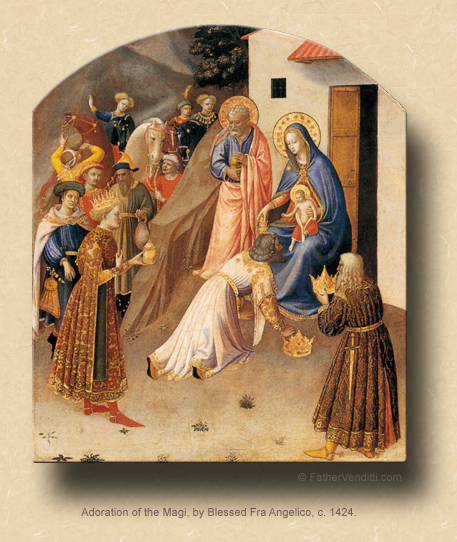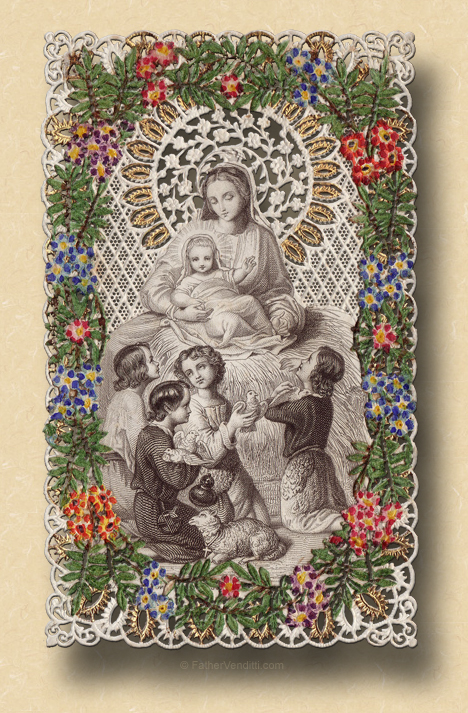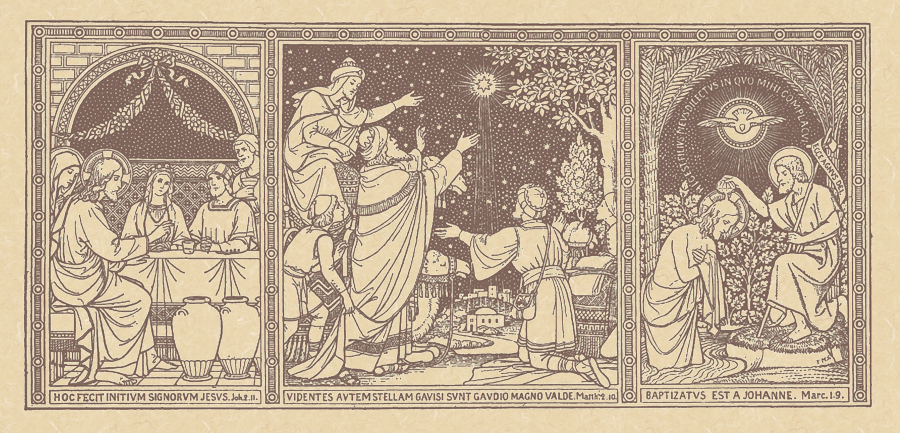If You're Poor, You're Crazy, but If You're Rich, You're Just Eccentric.
The Solemnity of the Epiphany of the Lord.
Lessons from the proper, according to the ordinary form of the Roman Rite:
• Isaiah 60: 1-6.
• Psalm 72: 1-2, 7-8, 10-13.
• Ephesians 3: 2-3, 5-6.
• Matthew 2: 1-12.
|
Outside the United States & wherever the Epiphany is observed on January 6th:
The Second Sunday after the Nativity.
Lessons from the proper, according to the ordinary form of the Roman Rite:
• Sirach 24: 1-2, 8-12.
• Psalm 147: 12-15, 19-20.
• Ephesians 1: 3-6, 15-18.
• John 1: 1-18.
|
The Second Class Feast of the Most Holy Name of Jesus.*
Lessons from the proper, according to the extraordinary form of the Roman Rite:
• Acts 4. 8-12.
• Psalm 105: 47.
• Luke 2: 21.
The Sunday before the Theophany; the Feast of the Holy Prophet Malachi; the Feast of the Holy Martyr Gordius; and, the Feast of Venerable Genevieve of Paris.
Lessons from the pentecostarion, according to the Ruthenian recension of the Byzantine Rite:
• II Timothy 4: 5-8.
• Mark 1: 1-8.
FatherVenditti.com
|
 8:42 AM 1/3/2016 — If ever there was a feast on our calendar with a confusing history, it's the Epiphany. The name comes from a variation of the Greek language called “Koine Greek” (ἡ κοινὴ διάλεκτος, meaning “the common dialect), a low-class sort of colloquial form of Greek, now a dead language, used throughout the Hellenistic regions of the Roman Empire, and is the dialect in which most of the New Testament was written. Ἐπιφάνεια, in this dialect, means “manifestation” or “striking appearance.” In the Eastern Churches, the feast is called Theophany, which comes from the same word in classical Greek, Θεοφάνεια, which literally translates as “the vision of God.” The traditional date for the feast has always been January 6th, but in the United States it's always transferred to the Sunday following the Octave of Christmas.** 8:42 AM 1/3/2016 — If ever there was a feast on our calendar with a confusing history, it's the Epiphany. The name comes from a variation of the Greek language called “Koine Greek” (ἡ κοινὴ διάλεκτος, meaning “the common dialect), a low-class sort of colloquial form of Greek, now a dead language, used throughout the Hellenistic regions of the Roman Empire, and is the dialect in which most of the New Testament was written. Ἐπιφάνεια, in this dialect, means “manifestation” or “striking appearance.” In the Eastern Churches, the feast is called Theophany, which comes from the same word in classical Greek, Θεοφάνεια, which literally translates as “the vision of God.” The traditional date for the feast has always been January 6th, but in the United States it's always transferred to the Sunday following the Octave of Christmas.**
And from hearing today's Gospel lesson from Saint Matthew, you can tell that we are meant to commemorate today the visit of the Magi to the manger. The Magi are pagans—some translations call them “astrologers from the East”—who come to do homage to God become Man. They've come to know about the Incarnation of God into this world through their own mystical means, and their desire to worship God as an infant is a precursor of Christ's completion of salvation history: they are a prefiguring of the Gentiles who will be converted to the faith by Saint Paul, and announce from the very beginning of our Blessed Lord's life on earth that He has come to save all mankind. Both of the other lessons read on this day testify to this fact. Isaiah prophesies: “Lift up thy eyes and look about thee; who are these that come flocking to thee? Sons of thine, daughters of thine, come from far away…” (60: 4 Knox); and, the Blessed Apostle Paul, himself, tells us “that through the gospel preaching the Gentiles are to win the same inheritance, to be made part of the same body, to share the same divine promise, in Christ Jesus” (Eph. 3: 6 Knox).
Obviously, the Epiphany is a feast of deep mystical significance, and I could dazzle you with some sort of esoteric musings about it all; but, I fear that sometimes the cerebral nature of these homilies may have fried some of your brains. So, instead of all that, I would like to take you back a couple of days to the Solemnity of Mary the Mother of God on January 1st, which was also First Friday. Most of you were not here for Holy Mass on that day; for those that were, feel free to go out for a smoke.
The Gospel lesson for that day presented to us another kind of Epiphany: not the visit of the Magi, but the visit of the shepherds, and I can't help but picture it as a somewhat surreal scene (Luke 2: 16-21). Consider any of the traditional artistic depictions of the Epiphany you may have seen, or even right here in our own Nativity set: the Magi are always shown dressed to the teeth in all their finery, usually with crowns on their heads; and, they're certainly not empty-handed, their gifts of gold, frankincense and myrrh borne in elaborate treasure chests.  But you don't see too many artistic renderings of the visit of the shepherds. I'm tempted to picture the visit of the shepherds as a kind of Spike TV version of the Epiphany: they're scruffy-looking because they're shepherds; they haven't brought anything with them; they tell Mary and Joseph this bizarre tale about how they heard about the birth of their Son from some invisible choir of angels. It's interesting to note that, practically speaking, there are no commentaries on these verses. Everyone, from the Fathers of the Church of the second century to Pope-Emeritus Benedict, wax eloquent about the visit of the Magi and its theological implications, dazzling us with thoughts about the mystical significance of the gifts they bring, and so forth; but, nobody seems to have anything to say about the shepherds or what they're doing there. The Gospel says that “All those who heard it were full of amazement at the story which the shepherds told them…” (Luke 2: 18 Knox). I'll bet they were; they were probably scratching their heads thinking, “Who on earth are these idiots?” But you don't see too many artistic renderings of the visit of the shepherds. I'm tempted to picture the visit of the shepherds as a kind of Spike TV version of the Epiphany: they're scruffy-looking because they're shepherds; they haven't brought anything with them; they tell Mary and Joseph this bizarre tale about how they heard about the birth of their Son from some invisible choir of angels. It's interesting to note that, practically speaking, there are no commentaries on these verses. Everyone, from the Fathers of the Church of the second century to Pope-Emeritus Benedict, wax eloquent about the visit of the Magi and its theological implications, dazzling us with thoughts about the mystical significance of the gifts they bring, and so forth; but, nobody seems to have anything to say about the shepherds or what they're doing there. The Gospel says that “All those who heard it were full of amazement at the story which the shepherds told them…” (Luke 2: 18 Knox). I'll bet they were; they were probably scratching their heads thinking, “Who on earth are these idiots?”
Of course, the visit of the shepherds is similar to the one we read about today in the Epiphany, but not exactly: the Magi cut a very different profile from the shepherds. What is it they used to say? If you're poor, you're crazy, but if you're rich, you're just eccentric. Both groups of men have fantastic stories to tell about how they came to know about the birth: the shepherds are hearing choirs of angels, the Magi are chasing after a UFO; but, both have come to do Christ homage. The Magi get a feast on the Roman Calendar to commemorate their visit; the shepherds get an afterthought on a feast of the Mother of God. I wonder which visit our Lord appreciated more.
The Solemnity of the Maternity of the Blessed Virgin was New Years Day, so I will make the same suggestion to you that I made to those who were here that day: that we take a page from the secular world around us and use the occasion of the new year to take stock. Of course, there's no reason the new year has to be the only time we can put the mistakes of the past behind us and hit the reset button, but it seems natural for people to do so.
So, who have you been this past year, and whom do you want to be? Some people, I suppose, are fortunate enough to be Magi: well respected, always appreciated, all the mistakes they make are somehow excused; but most of us, I think, are shepherds: schlepping along, doing the best we think we can for our Lord, grateful for what we've received, but never seeming to have much to give in return. And I think we need to be OK with that, especially since our Blessed Mother was OK with it. After all, when the Magi are done bowing and scraping and handing over their expensive presents and then leave, nothing is said; there is no recorded reaction from either the Mother of God or Her husband in the Scripture passages about the Epiphany. But after the shepherds leave, Saint Luke is very clear: “And Mary kept all these things, reflecting on them in her heart” (Luke 2: 19 NABRE). And I, for one, am quite satisfied to be a reflection in the Heart of our Immaculate Mother.

* In the extraordinary form of the Roman Rite, the Second Class Feast of the Most Holy Name of Jesus is always celebrated on the Sunday between the 2nd & 5th of January (or, if there is no such Sunday, on January 2nd), with the Epiphany always celebrated on January 6th (cf. note below). Note that the Ordo for Holy Mass provided for the extraordinary form at "divinumofficium.com" is in error, incorrectly identifying today as a ferial day of Christmas, repeating the lessons from January 1st; oddly enough, the Ordo for the Divine Office is correct, identifying today as the Feast of the Holy Name.
In the ordinary form, the Memorial of the Most Holy Name of Jesus, usually observed on the 3rd, is suppressed this year in favor of the Epiphany.
** In the extraordinary form of the Roman Rite, the First Class Feast of the Epiphany, always celebrated on January 6th, commemorates three events in the life of our Blessed Lord: His manifestation to the gentiles in the visit of the Magi, His manifestation as the co-eternal Son of God in His baptism by John, and His manifestation as God Incarnate in the miracle at the wedding at Cana. Hence, the woodcut print serving as the top image for this page, taken from an edition of the Missal of St. John XXIII, displays all three events together. While the Epiphany is not officially followed by an octave, it does have a sort of octave day, January 13th, which carries the title of the Baptism of the Lord, and appears to be a second commemoration of that event; but, the Mass and office of that day are almost identical to that of the Epiphany and, should it fall on a Sunday, it is completely displaced by the Feast of the Holy Family.
In the ordinary form of the Roman Rite, the Solemnity of the Epiphany, celebrated on January 6th on the universal calendar and on the Sunday following the Octave in the United States, commemorates only the visit of the Magi, with His baptism commemorated on the following Sunday, the Feast of the Baptism of the Lord, after which the season of Ordinary Time begins. The Gospel of the Wedding at Cana is read on January 7th should that day fall before the Epiphany; otherwise, it is not commemorated until the Second Sunday of Ordinary Time, and then only on every third year, when the lessons of the tertiary dominica are read.
In the typicon of the Byzantine-Ruthenian Rite, the Solemn Holy Day of the Theophany, always celebrated on January 6th, commemorates only the Baptism of the Lord, and thus corresponds to next Sunday in the ordinary form (and sometimes January 13th in the extraordinary form) rather than to the Epiphany, with there being no specific commemoration of the visit of the Magi apart from Christmas Day. The Wedding at Cana is not commemorated in this season, but first appears in the Divine Liturgy for the Second Monday of Pascha (Easter).
|

